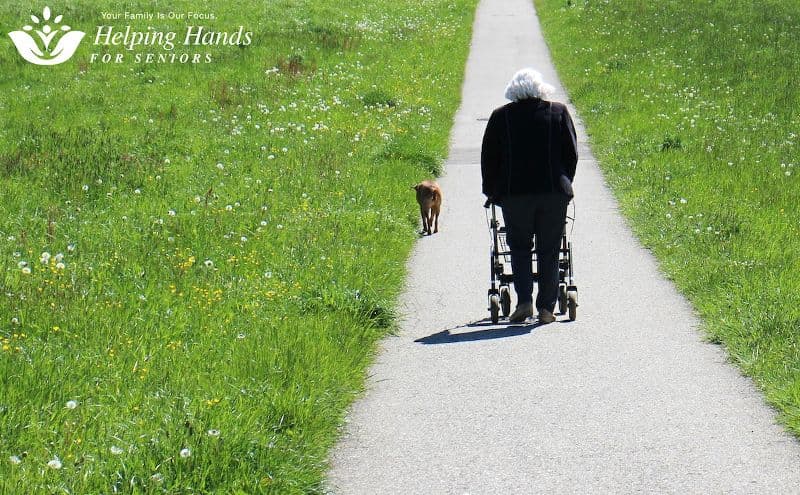Elderly Falls: Protecting Your Loved Ones in Portland, OR
Every second of every day in the United States an older adult falls, making falls the number one cause of injuries and deaths from injury among older Americans. Helping Hands for Seniors understands that protecting your loved ones and preventing elderly falls is crucial. This is why we are discussing the facts on falls, awareness of the risk factors, and prevention tips for health and home.
Elderly falls are a serious issue causing pain, loss of mobility, disability, loss of independence, and can even cause premature death. Common injuries resulting from older adult falls include: hip fracture, head trauma, and broken arms, wrists, or ankles.
However risk can be reduced and many falls can be prevented. These are some simple things you can do to keep yourself or your senior loved one from accidental falls and tripping.
Facts About Falls:
- According to the World Health Organization, a staggering 28-35% of people aged 65 and over fall each year, increasing to 32-42% for those over 70 years of age.
- More than one out of four older people falls each year, but less thahttps://www.who.int/ageing/projects/falls_prevention_older_age/enn half tell their doctor. However, older adult falls are largely preventable. Health care providers can play an important role in fall prevention by discussing falls with senior patients and providing appropriate interventions and guidance.
- Falling once doubles the chances of falling again.
- One out of five falls causes a serious injury such as broken bones or a head injury.
- Each year, 3 million older people are treated in emergency departments for fall injuries.
- Each year, at least 300,000 older people are hospitalized for hip fractures.
- More than 95% of hip fractures are caused by falling—usually by falling sideways.
- Women fall more often than men and account for three-quarters of all hip fractures.
Risk Factors:
The CDC lists the following as risk factors for older adult falls:
- Lower body weakness.
- Vitamin D deficiency.
- Difficulties with walking and balance.
- Use of certain medications.
- Vision problems.
- Foot pain or improper footwear.
- Home hazards, including uneven steps.
Prevention Tips:
- Keep active! Regular exercise, walking, and stretching helps to keep the body strong and stabilized. In particular, do specific strength and balance exercises. These types of exercises will improve balance which is pivotal for senior mobility.
- Make sure you wear proper, supportive footwear for walking and daily activity. Shoes need to fit well and have non-slip soles. Poor shoes or foot pain can contribute to falls so address any ongoing foot or joint pain with your doctor.
- Talk with your doctor or healthcare professional about your personal risk for falling. Ask them to evaluate your risk and any specific preventative steps you can take. Also review your medicines (both prescription and over-the-counter) with the doctor to determine if any might impair your balance or cause sleepiness or dizziness.
- Have your vitamin D levels checked for any deficiency. Unfortunately, about 42% of the US population is vitamin D deficient with some populations having even higher levels of deficiency including people over age 65.
- Have your eyes checked. Vision problems can cause dizziness and lead to accidental falls. Visit the eye doctor at least once every year and be sure to update your prescription eyeglass lenses right away if there are changes in eyesight.
- Assess mobility with performance-based measures. These assessments often take into consideration the maximum gait speed and any perceived difficulties or restrictions you may have. This is important to understand your mobility limitations and address them before further functional decline. With increasing age, underlying conditions, physiological and sensory impairments, and environmental barriers increase the risk for mobility decline. To fight against this risk of decline, it is important for seniors and those around them to promote their functional capacity and support their mobility efforts.
Prevent Falls At Home:
- Get rid of clutter and things you could trip over. The clearer the environment, the easier it is to navigate and get around. Keep floors clear of items like shoes or boxes and make sure any carpeting is secure.
- Make sure the entire home is well lit. Use brighter bulbs and increase lighting, particularly near stairs, in hallways, and in the bedroom. When getting up in the middle of the night, make sure light switches or lamps are easy to turn on so you don’t have to struggle in the dark. An additional safety precaution is well-placed night lights.
- Install secure railing on both sides of stairs.
- Keep items that are used daily in easy to reach places and shelves. This reduces the risk for a dangerous fall from higher. Seniors with impaired balance or other risk factors should not use step stools frequently to try and reach high shelves or cabinets. If a step stool is used, make sure it is stable before stepping each time.
- Install bathroom grab bars in the bathtub/shower and next to the toilet as well. Additional safety precautions could be a shower chair for sitting and a handheld shower head.
- Use a non-slip mat inside the shower and have a bath mat down outside as well. The wet bathroom floor can be dangerous for slipping so have the mat ready to walk on. Other slippery surfaces to watch out for include hardwood floors (especially when they’re freshly mopped) as well as icy exterior walkways during the colder months.
- Take your time moving throughout your home. Moving quickly increases clumsiness and the chance of falling or tripping. Move at a careful slow pace and don’t rush.


